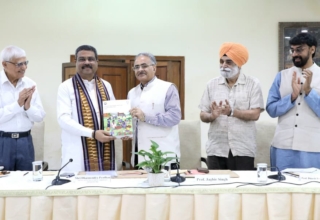
By 31st March 2018, an estimated 18000 teacher education or training colleges will be ranked and those securing ‘D’ will have to shut their shop
 Acknowledging the widely held perception that some private teacher training institutes (TEIs) recognized by it were indulging in corrupt practices including selling B Ed degress, the National Council for Teacher Education (NCTE, set up in 1993), has decided to make systemic change by going digital to weed out corruption from affiliated colleges and within NCTE. It has asked all affiliating colleges to upload verifiable documents on its website and put all information in public domain. The process has to be completed by July 31 this year.
Acknowledging the widely held perception that some private teacher training institutes (TEIs) recognized by it were indulging in corrupt practices including selling B Ed degress, the National Council for Teacher Education (NCTE, set up in 1993), has decided to make systemic change by going digital to weed out corruption from affiliated colleges and within NCTE. It has asked all affiliating colleges to upload verifiable documents on its website and put all information in public domain. The process has to be completed by July 31 this year.
With the April 28, 2017 notification on amended NCTE Act, 1993, NCTE under sub-section 2 of section 32 has made obtaining of accreditation mandatory for teacher training institutions once in five years from an agency identified for 6 years period. Consequently, Quality Council of India (QCI) an autonomous agency under the Department of Industrial Policy and promotion was selected as the accreditation agency. Earlier it was done by NAAC (National Assessment and Accreditation Council) which has accredited only 1522 institutions between 2002 and 2017.
The data for TeachR (portal) will be collected through a self-evaluation form to be submitted by the TEI. Items which simply require verification of facts will be checked through on-ground assessments. Items which require qualitative analysis will be reviewed remotely by a peer review panel.
Institutions will be categorized as A, B, C, or D. Category A and B insiutions comprise those fit to continue delivering teacher education .This category will be granted more autonomy over their function through a reduction in regulatory oversight. Category C and D institutions are those whose quality of education is found to be insufficient. While as C category TREIs will be granted one year to meet the necessary standards, Category D organizations will need to stop admitting new students immediately and shut down in an orderly manner.
This new accreditation and ranking framework will be first implemented in Bihar as part of the compliance with the order of the Patna High Court. TEIs across the rest of country are therefore required to register on the TeachR platform immediately and submit the necessary details.
The final ranking after upload on NTP for accreditation, on-site validation, audio-video recording, feedback and expert perception survey will be made public by March 31, 2018. So watch out!
 NCTE also held a few open houses with the managements of TEIs, who are unhappy the way things are going in their way. They say if quality of teachers is bad, some blame has to be shared by NCTE as well. When the country talks of teacher shortage, 20,000 seats of the 65,000 sanctioned seats are not being filled up this year as the entrance exams are held just for a a couple of days and that too in midsession around January . “We have no control over admissions, so we can’t filter for quality. Also, there are several grey areas where NCTE regulations are not clear,” says Dr Rajeet Khare from Madhya Pradesh. However, the chairman of NCTE, A Santhosh Mathew, IAS dismisses such criticism saying that owners have aspirations for making money while as this is a non-commercial activity. At the same time, he acknowledges that fees cannot suffice for the cost of running TEIs, he advises them to look for resources from CSR etc.
NCTE also held a few open houses with the managements of TEIs, who are unhappy the way things are going in their way. They say if quality of teachers is bad, some blame has to be shared by NCTE as well. When the country talks of teacher shortage, 20,000 seats of the 65,000 sanctioned seats are not being filled up this year as the entrance exams are held just for a a couple of days and that too in midsession around January . “We have no control over admissions, so we can’t filter for quality. Also, there are several grey areas where NCTE regulations are not clear,” says Dr Rajeet Khare from Madhya Pradesh. However, the chairman of NCTE, A Santhosh Mathew, IAS dismisses such criticism saying that owners have aspirations for making money while as this is a non-commercial activity. At the same time, he acknowledges that fees cannot suffice for the cost of running TEIs, he advises them to look for resources from CSR etc.










